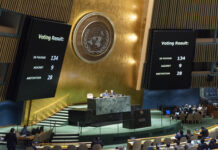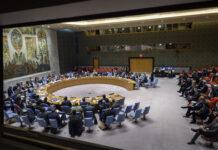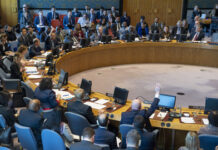Photo credit: DiasporaEngager (www.DiasporaEngager.com).
Geneva/ Maputo, 22 March – More than 48,000 people have been affected in the provinces of Gaza, Inhambane, Maputo and Sofala by the impact of Tropical Storm Filipo that made landfall in Mozambique on 12 March. Strong winds and torrential rains wreaked havoc across the central and southern provinces, causing widespread flooding and leaving a path of destruction in its wake including damage to homes, livelihoods, and essential infrastructures.
“The entire roof was taken off. That’s when I ran to get my son,” Inocência Fernando, a resident of one of the affected areas, recounts. “I lost my coconut trees, cashew trees, my clothes flew away, and I don’t even know where the roofing sheets ended up.”
Food, clean water, sanitation, health and shelter are the most urgent needs identified through a joint multisectoral assessment by the International Organization for Migration (IOM), the National Institute for Disaster Management (INGD), UNICEF, WFP and OCHA. Additionally, the reconstruction and rehabilitation of damaged infrastructures were also identified as essential priorities with 8,000 houses either partially or completely damaged, along with 146 schools, numerous health centres, electric poles, and roads.
The Organization dispatched 344 shelter kits including tarpaulins, thermal blankets and mosquito nets to assist the families impacted by the storm in the District of Machanga, Sofala Province with many more needed to meet the needs from the extensive impact.
IOM’s Displacement Tracking Matrix (DTM) and Camp Coordination and Camp Management (CCCM) teams have been deployed and are closely supporting the government to collect data on populations and on displacements, monitor the needs of affected populations, and support the coordination of the response efforts.
The impact of the tropical storm has exacerbated existing vulnerabilities in the country and compounded the growing needs from the ongoing crises the country is already facing, including the cholera outbreaks in central and northern parts of the country. Heavy rainfall and flooding have increased the risks of the spread of cholera, and aggravated challenges resulting from the recent escalation of the conflict and subsequent population displacements.
Mozambique is amongst the ten countries that are most vulnerable to climate change and natural hazards. In the past years, climate change has led to more intense and frequent disasters, resulting in significant loss and damage, including mass population displacements. Its location along the coastline exposes the country to the seasonal cyclones in Southern Africa region impacting agriculture that is heavily relied upon in the country. Climate change represents a major obstacle to Mozambique’s socio-economic development, increasing challenges resulting from fragility, conflict and violence. Without adaptation, an additional 1.6 million people could fall into poverty by 2050 accordingly with the World Bank Country Climate and Development Report for Mozambique.
“With recurrent natural hazards and ongoing conflicts exacerbating the humanitarian crisis, the road to recovery for the affected communities will be long and challenging. It is imperative that the international community steps up its support to ensure that those affected receive the assistance they need to rebuild their lives and communities, paving the way for sustainable solutions” reinforces Laura Tomm-Bonde, IOM Mozambique Chief of Mission.
Since December 2023, Mozambique is experiencing a deepening humanitarian crisis, marked by an escalation of the conflict in the northern provinces and severe climatic shocks affecting the central and southern provinces. It is estimated that over 160,000 individuals across the country have been recently affected by violence and disasters, adding to the 700,000 already displaced due to the conflict.
IOM requires urgent support to respond to the needs of populations affected by the conflict in the north and climatic shocks in the center and south of Mozambique. Only 15 per cent of the USD 43 million requested by IOM as part of the USD 413 million 2024 Humanitarian Response Plan (HRP) has been funded so far, with IOM estimating that an additional USD 3.9 million will be necessary to address needs arising from the increase of violence in the northern regions and the impact of the tropical storm. Without additional financial support, essential response and service delivery may be compromised, leaving thousands of people in a situation of extreme vulnerability without access to lifesaving assistance.
***
For more information please contact:
Maputo: Amanda Nero, anero@iom.int
Pretoria: Abibo Ngandu, angandu@iom.int
Source of original article: International Organization for Migration (www.iom.int).
The content of this article does not necessarily reflect the views or opinion of Global Diaspora News (www.GlobalDiasporaNews.com).
To submit your press release: (https://www.GlobalDiasporaNews.com/pr).
To advertise on Global Diaspora News: (www.GlobalDiasporaNews.com/ads).
Sign up to Global Diaspora News newsletter (https://www.GlobalDiasporaNews.com/newsletter/) to start receiving updates and opportunities directly in your email inbox for free.































